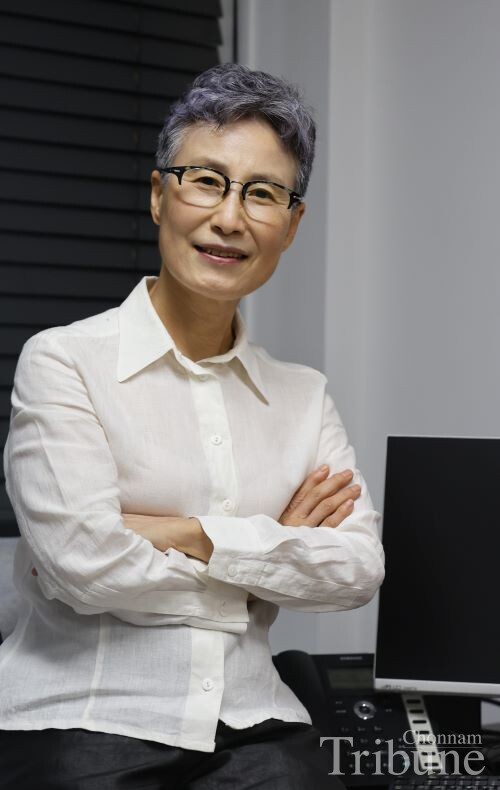Professor Emeritus Roh Seung-hee
On Aug. 31, Professor Emeritus Roh Seung-hee retired from the Department of English Language and Literature at Chonnam National University. She specialized in Shakespeare, early modern literature, and gender studies, exploring historical contexts, literary forms, and gender representation. Through this interview, the Chonnam Tribune invites readers to discover her academic journey and perspective. – Ed.

What led you to focus on William Shakespeare as your primary research subject?
I encountered Shakespeare at three important moments in my life in high school, college, and graduate school. In high school, my Korean literature teacher assigned us a year-long reading diary. After thinking about how to approach it, I decided to read the complete works of one author from beginning to end. I chose Shakespeare after discovering a complete set of his works in the school library, an uncommon resource for a high school at the time. Later, when the universities were closed due to the 1980s political unrest, I wrote a critical paper on “Hamlet” to complete the course. I focused on a scene where Hamlet uses sexual insults toward his mother and Ophelia. I was struck that such degrading language came from a character often regarded as noble. In my doctoral program, I studied under a professor who specialized in Shakespeare and early modern literature. That guided me onto this academic path.
What common characteristics do you see in Shakespeare’s works?
In the late 16 and early 17 centuries, when Shakespeare was active, Western Europe was still largely under Christian influence but also was undergoing major social and religious transformations. The concept of the individual was emerging, and divisions within the Church of England enabled Catholic factions. In Shakespeare’s works, characters often appear as individuals with their own truths, sometimes coming into conflict with the values and norms of the community. In his comedies, individuals with personal desires ultimately find harmony within the community, whereas in his tragedies, the flaws of the social system are exposed, revealing a society unready to accept talented individuals outside the hereditary monarchy. This constant tension between the freedom-seeking individuals and the values of the community is one important theme throughout Shakespeare’s works.
One of your fields of expertise is gender studies. What led you to be interested in it?
Gendered social roles were much more strictly defined in the past. Even in literature, most protagonists were male, which naturally led me to wonder about women’s experiences. When I graduated from university, feminism was just starting to emerge in academic discourse. I became increasingly interested in the idea of the individual through existentialist writers like Albert Camus, who was an icon for me at the time. Naturally, this led me to engage in literary gender studies during my graduate school years.
Many plays depict conflicts between personal desire and societal rules. What do you think Shakespeare wanted to convey?
Many of Shakespeare’s plays explore tension between personal desire and societal rules. In “Macbeth,” for example, an ambitious but unrecognized hero kills the king, even though such violence goes against his nature. Shakespeare was among the first to use soliloquy to reveal a character’s inner thoughts, allowing audiences to witness their self-examination and moral struggles in depth. By portraying characters who pursue their choices to the very end, sometimes with regret but without surrendering control over their fate, he examined how much freedom a community can tolerate. When society cannot permit their chosen destiny, the tragic hero must bear the consequences.
In many plays, female characters show power beyond the roles assigned to them in their time. What does this mean to you?
Not all of Shakespeare’s female characters are portrayed as empowered, and many are shown as victims. However, some creatively bypass the restrictions of their era, such as disguising themselves as men to serve as judges or negotiators. These moments demonstrate that women are just as capable as men. They also highlight the unfairness of the laws and customs that limited women’s opportunities. To me, this reflects Shakespeare’s hope for a fairer society, one that recognizes women’s talents and moves toward greater equality and quality of life for everyone.
Has your interpretation of certain works changed over time?
My perspective on “Hamlet” has changed significantly since I first watched the play as a university student. At that time, I focused mainly on Hamlet’s language. His harsh words toward Ophelia, such as telling her to “Get thee to a nunnery,” felt disturbing and disrespectful to women, especially given his image as a noble figure. Now, however, I see “Hamlet” less as a portrait of an individual and more as a profoundly political work. Its underlying message, “The king is nothing,” is a critique of hereditary rule and its instability. This has entirely shifted my interpretation of the play.
How do you see the relevance of classics like Shakespeare today, and what advice would you give to young scholars?
Literature is both a thought experiment and a mirror for self-reflection. It offers memorable lines, insights into history, and deeper emotional resonance when read in the original language. Every word holds layered meaning that, understood in context, enriches one’s perspective. I want to encourage young people to read widely and respond in their own ways to the situations presented in literature. Such habits foster critical thinking and independence, helping to keep classics relevant in any era.
What are your special plans after retirement?
I plan to continue reading and writing and to volunteer in local programs where I can read English books with children in a relaxed, non-graded setting. I also hope to join initiatives that help seniors stay active and engaged in the community. In my hometown of Daejeon, I would like to perform chamber music in public parks, continue playing the violin, and learn the cello or flute—an idea inspired by the Korean music program “Begin Again.”
By Kim Min-gyeong, Reporter
